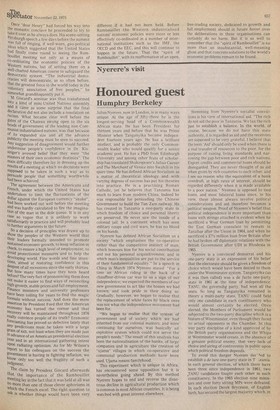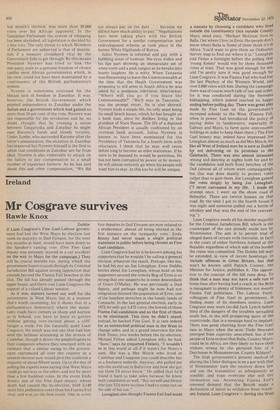Nyerere's visit
Honoured guest
Humphry Berkeley
Julius Nyerere, now in London, is in many ways unique. At the age of Jifty-three he is the longest-serving head of a Commonwealth African state. He has been President for thirteen years and before that he was Prime Minister when Tanganyika became independent fourteen years ago. He has a brilliant intellect, and is probably the only Commonwealth leader who would qualify for a senior academic post. He has a PhD from Edinburgh University and among other feats of scholarship has translated Shakespeare's Julius Caesar and The Merchant of Venice into Swahili in his spare time. He has defined African Socialism as a matter of theoretical ideology and with varying degrees of success has put his theories into practice. He is a practising Roman Catholic, yet he believes that Tanzania has much to learn from modern China. Indeed he was responsible for persuading the Chinese Government to build the Tan-Zam railway; He has created in Tanzania a one-party state in which freedom of choice and personal liberty are preserved. He never saw the inside of a colonial jail. In a continent which has seen military coups and civil wars, he has no blood on his hands.
Nyerere has defined African Socialism as a society "which emphasises the co-operative rather than the competitive instinct of man; which honours him for his social, contribution and not his personal acquisitiveness; and in which man's inequalities are put to the service of their fundamental equality." In a speech in China in March 1974 Nyerere stated: "For a time an African riding in the back of a chauffeur-driven car was to us a sign of our independence; we expected the members of our new government to act like the bosses we had known; and took pride in their doing so. Gradually, however, we began to realise that the replacement of white faces by black ones was not what the independence movement had been for.
"We began to realise that the system of government and of society which we had inherited from our colonial masters, and were continuing for ourselves, was basically an exploitive system which could not serve the people's needs." The result of this analysis has been the nationalisation of the banks, of large companies and in agriculture the creation of "ujama" villages in which co-operative and communal production methods have been used. Ujama means familyhood.
This experiment which is unique in Africa, has . encountered some opposition but it is nevertheless going ahead. By this method Nyerere hopes to end and reverse the disastrous decline in agricultural production which is common in most African countries. It is being watched with great interest elsewhere.
Stemming from Nyerere's socialist convictions is his view of international aid. -The rich do not aid the poor in Tanzania. We tax the rich just to establish a balance. In the world, of course, because we do not have this state authority, it is regarded as aid and the receivers are supposed to be very grateful. I believe that the term 'Aid' should only be used when there is a real transfer of resources to the poor, for the purpose of raising living standards and narrowing the gap between poor and rich nations. Export credits and commercial loans should be disregarded. They are never thought of as aid when given by rich countries to each other, and I see no reason why the equivalent of a bank overdraft, at high rates of interest, should be regarded differently when it is made available to a poor nation." Nyerere is opposed to tied loans, and most bilateral loans since, in his view, these almost always involve political considerations and aid therefore becomes a political weapon. Proof of Nyerere's belief that political independence is more important than loans with strings attached is evident when he sacrificed a West German loan by permitting the East German consulate to remain in Zanzibar after the Union in 1964, and when he sacrificed a £71/2 million loan from Britain after he had broken off diplomatic relations with the British Government after UDI in Rhodesia in 1965.
Nyerere is a convinced democrat and his one-party state is an expression of his belief that the electorate should be given a freedom of choice which would have been denied to them under the Westminster system. Tanganyika (as it was then called) was a de facto one-party state in 1961 at the time of independence. TANU, the governing party, had won all the seats. So long as Tanganyika remained in theory a multi-party state, TANU could field only one candidate in each constituency who would almost certainly be elected. Once elected, the Members of Parliament would be subjected to the two-party discipline which is a feature of Westminster, even though they faced no actual opponents in the Chamber. In this way party discipline of a kind approved of by the British party organisations and the Whips at Westminster would create, in the absence of a genuine political enemy, that verylack of choice and airing of controversy in public upon which political freedom depends. —
To avoid this danger Nyerere dec.-led to establish a de lure one-party state in T izania. In each general election, of which there have been three since independence in 1961, two .TANU candidates fought each other in each constituency. In the 1965 election nine ministers and over forty sitting MPs were defeated. In each election Derek Bryceson, of English birth, has secured the largest majority which, in
last month's election, was more than 20,000 votes over his African opponent. In the Tanzanian Parliament the system of whipping has been abolished; all legislation is decided by a free vote. The only threat to which Members of Parliament are subjected is that of dissolution if a measure considered vital by the Government fails to get through. By this means President Nyerere has tried to link the one-party state to a genuine freedom of choice (unlike most African governments) which, in his view, could not have been maintained by .a continuance of the British parliamentary system.
Nverere is sometimes criticised for the blatant lack of freedom in Zanzibar. It was, however. the British Government which granted independence to Zanzibar under the Sultan and a government which had gained no more than 34 per cent of the vote. Nyerere was not responsible for the revolution and he, no doubt, thought that by creating a union between Tanganyika and Zanzibar he might ease Karume's harsh and bloody tyranny. Under Jumbe, who succeeded Karume after the latter's assassination, the situation in Zanzibar has improved but Nyerere himself is the first to admit that conditions in Zanzibar are far from ideal. Nyerere is also vulnerable to attack on the failure to pay compensation to a small number of expatriate farmers. As he has said about this and other compensation, "We did not always pay on the date . . . because we did not have much ability to pay." Negotiations have been taking place with the British Government for a similar compensation and redevelopment scheme as took place in the former White Highlands of Kenya.
Julius Nyerere is informal and gay with a bubbling sense of humour. His eyes widen and his lips part showing an immaculate set of white teeth and a pink tongue as he breaks into hearty laughter. He is witty. When Tanzania was threatening to leave the Commonwealth at the time that the Heath Government was proposing to sell arms to South Africa he was asked by a pompous television interviewer, "Where will you go if you leave the Commonwealth?" "We'll stay in Tanzania," was the prompt retort. He is also shrewd. Nyerere leads a simple life, his only asset being his small beach house, which he has bought on a bank loan, since he dislikes living in the grandeur of State House. The life of a deposed African President is usually cushioned by an overseas bank account. Julius Nyerere is known to have been nominated for the Presidency of Tanzania for a fourth term with reluctance. I think that he may well retire before long to become an elder statesman. If he were to be deposed he would be penniless. He has not been corrupted by power or by money. He will almost certainly go when his people still want him to stay. In this too he will be unique.

































 Previous page
Previous page